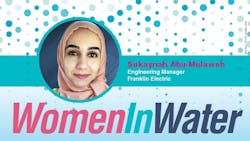Women in Water: Sukaynah Abu-Mulaweh, Franklin Electric
Bob Crossen is the senior managing editor for Water & Wastes Digest. Crossen can be reached at [email protected].
undefinedWhy Water?
Simply stated: water is essential. To be able to wake up every day and work in an industry that commits to developing systematic solutions that provide access to one of life’s most essential resources is gratifying. In fact, that’s why I joined Franklin Electric. I have always been passionate about helping others and doing my part to make the world a better place, so to be blessed to work in an industry that makes a positive impact in the world, makes me not only content but proud.
What about your current position excites you?
As the Engineering Manager of the Value Engineering (VE) team, I have a unique opportunity to not only build a winning team but develop a global strategy to improve the value of our engineered products. I’m excited to build effective working relationships with my team, learn their key strengths, then develop and hone their role to leverage these strengths to achieve our department’s key strategic objectives. This ties directly to the other exciting part of my position which is to develop a global VE strategy. We have the challenge to develop the foundational process and associated tools to effectively analyze our current products, identify strategic opportunities, and develop holistic solutions to improve the value of the product for all our customers, both internally and externally.
What is your moonshot idea for solving what you consider to be the most important water industry problem today?
One of the most important water industry problems today is the slow adaption of innovation, specifically in the monitoring and IoT world. I believe this may be the most important problem because of how it is so interconnected to other major industry problems such as: aging infrastructure, lack of funding, climate change, and water conservation. By utilizing the advancement in technology to analyze and monitor the ecosystem of water and water management, predictive maintenance and preventive action can be taken to improve the water system and lessen the impact of issues that arise. My idea to solve this issue would be to better connect with consumers to illustrate the real need for this innovation and its systematic advantages in the long term. I believe by better educating and relating to the end customer, they will take the lead to demand these innovations and pull the industry into the 21st century.
What role has mentorship played in your career to date?
I have recently begun my first mentoring program a couple of weeks ago, and I’m excited my mentor is a powerhouse woman in leadership. I’m looking forward to the opportunity to learn from her vast experience in various leadership roles and hone the necessary skills to further accelerate my leadership growth.
Prior to this mentorship, the closest I have had to a mentor was a previous manager of mine who took his responsibility to build the next generation of leaders seriously. He saw potential in me and knew my career aspirations were in leadership, so he actively sought meaningful opportunities for me to expand my experience and breadth of knowledge. Although in the moment a few of those projects didn’t seem like opportunities, looking back now I can clearly visualize the brilliance in how each one of those projects expanded my range of experiences and helped propel my leadership growth.
What piece of media (books, TV shows, movies, games, podcasts, etc.) has had the greatest impact on you in the past 12 months?
TV shows and movies that have had realistic themes about society. They made me stop and reflect to understand the underlying cause of the issue and how to mitigate (or ideally eliminate) the issues in real life.
What does it mean to you to be a woman who works in the water industry?
We may make up a smaller group of the trade, but we have an opportunity to make a significant shift in the industry. Whether it is to be the catalyst for change in an industry ripe for a transformation (both technically and socially) or encourage the next generation of women to join the industry, we can leverage our key strengths, skills, and insights to change the game. As a woman in the water industry, I can attest that our perspectives bring a steady flow of innovative ideas and a movement of positive impact.
